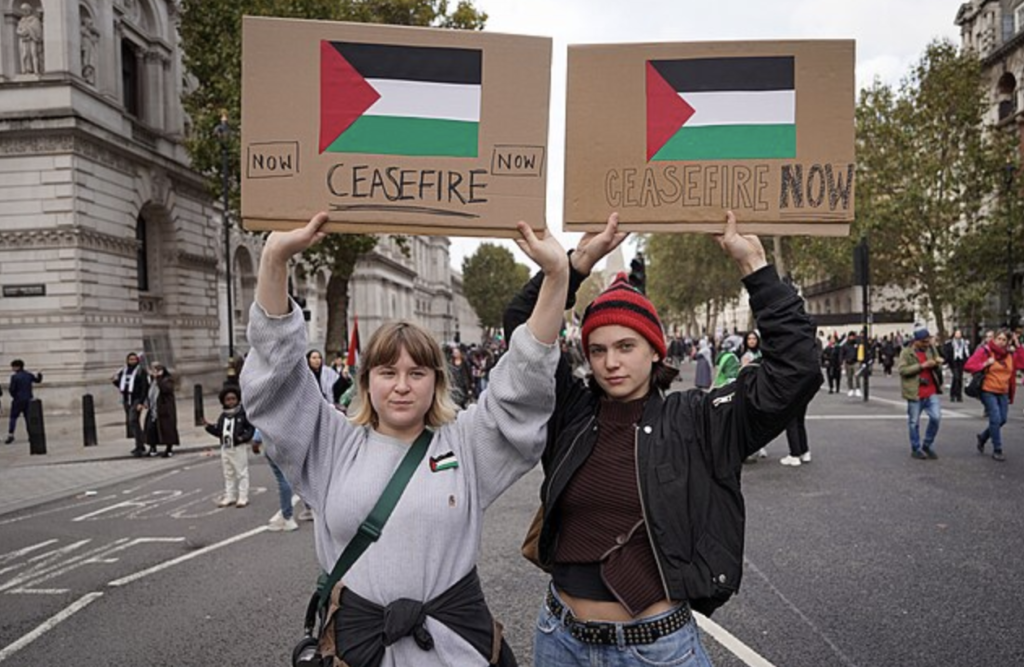Possibilities for a Ceasefire in Gaza

By: Ghassan Rubeiz / Arab America Contributing Writer
A ceasefire is urgently needed in Gaza, not just to start addressing a humanitarian crisis but also to open the door to a political solution.
After five months of fighting, the scene in Gaza is apocalyptic. The United Nations Relief and Works Agency for Palestine Refugees in the Near East (UNRWA) reports that 500,000 Palestinians remaining in northern Gaza now face starvation. (Mondoweiss March 2/2024)
Negotiations for a ceasefire have been going on for weeks. Three factors are likely to compel the two sides to stop fighting: Spreading famine, President Biden’s eroding popularity, and the start of the Muslim holy month of Ramadan next week.
The Democratic primaries in Michigan have demonstrated the importance of the Arab vote in this year’s presidential elections. Biden has taken several steps to rein in Netanyahu’s behavior in Gaza, but he remains generally supportive of Israel’s strategy.
With Ramadan approaching, a temporary ceasefire seems likely soon. We may even witness the declaration of a permanent ceasefire. But negotiations may also collapse.
Of these three scenarios, the first is the most likely. An immediate, permanent ceasefire is also possible, although unexpected. Finally, Israel may continue heavy fighting in Rafah.
1. Implications of a Temporary Ceasefire
The rationale for a temporary ceasefire would be to allow combatants and other parties (US, UN, EU, and some Arab states) to negotiate towards a “sustainable” ceasefire beyond the initial phase of six weeks. Such an extended pause would eventually lead to a political solution. This sounds unrealistic to me.
Political analyst Mitchell Plitnick makes a distinction between ending the genocide in Gaza on the one hand and achieving Palestinian self-determination on the other. A temporary ceasefire would be focused on the former but would not address the latter. A possible six-week ceasefire is touted as a cooling-off period, as though the conflict were a struggle between equals rather than an occupation that has festered for the better part of a century. The world has been promising Palestinians to end this injustice for decades. At best, a six-week pause in fighting would prevent the daily death of children from malnutrition and allow mothers to eat enough to feed their severely malnourished babies. Still, it will not deter Netanyahu from attempting to eradicate Hamas at the end of it. A six-week pause will do nothing to change attitudes that have been frozen for decades.
2. Implications of a Permanent Ceasefire
The rationale for a permanent ceasefire is clear: enough with fighting; it is time to discuss how to end the occupation. Palestinians have demonstrated to the Israelis that they are not leaving their homeland and that they will keep resisting as long as they are under occupation. On the other hand, Israelis have shown that under severe threats to their national security, they can quickly unite to defend themselves at any cost.
Taking a break from the fighting is just kicking the can down the road. Ending the fighting implies the recognition that the two sides have done enough damage to one another, that there is no winner in this war, that any victory is temporary, if not elusive, that the time for negotiating the freeing of Palestine has come; that the responsibility for killing tens of thousands of Palestinians and destroying living conditions for two million Gazans cannot be avoided; and lastly, that Hamas can be contained but not destroyed.
3. Implications of No Ceasefire
If the negotiations fail, the two sides will blame each other and open unprecedented rifts. Israel has warned Hamas that it may launch a ground assault on Rafah at the start of Ramadan. Israel would be gambling further with the lives of the remaining hostages. An incursion into Rafah would fuel the anger and agony of the families of the hostages. It would expose Israel’s continued disregard for international law by attacking the last refuge of 1.5 million cornered, desperate, and starving civilians. A new level of collective anger will grip the entire Arab and Muslim world. An incursion into Rafah may be the last straw for Hezbollah and other resistance groups. Israel is probably unprepared for the regional conflagration that will ensue; it is having trouble recruiting enough soldiers for the current heavy fighting. Wouldn’t a new Israeli massacre of Palestinians in Rafah be deemed evidence of genocide by the International Criminal Court and other international organizations?
Israel may, of course, be bluffing in hopes that Hamas will accept its terms for a ceasefire. It must be aware of the political cost of invading Rafah. On the other hand, Tel Aviv may be seriously considering an attempt to eradicate Hamas by invading Rafah. Netanyahu still dreams that with additional force, Hamas will sooner or later be gone, and the hostages will return home safely.
Assume for the sake of argument that Israel’s Defense Forces have managed to save the remaining hundred hostages and have completely neutralized Hamas through a well-studied, effective military assault. Netanyahu is now in charge of two and a half million people without shelter, food, medicine, or water. And if he expects that the tortured people of Gaza will cooperate with any Israeli authority after the immense suffering they endured for months, he is mistaken. He now truly has a nightmare in his hands.
Israel is approaching the end of the Gaza war without a sound plan for the day after. The acclaimed New York Times columnist Thomas Friedman, an old friend of Israel, recently lamented that Jerusalem is making a fatal mistake by denying the Palestinians a chance to achieve independence. He said, “Israel is losing the global narrative that it is fighting a just war. It has no plan to ever get out of Gaza, so it will eventually sink into the sands there with a permanent occupation that will surely complicate relations with all its Arab allies and friends across the globe. And it is losing regionally to Iran and its anti-Israel proxies in Lebanon, Syria, Iraq, and Yemen, who are pressuring Israel’s northern, southern, and eastern borders.” (NY Times)
A ceasefire is anticipated around the time this column is posted. Will it be just a break from hostilities or a historic opportunity to finally address the grievances of the people of Gaza and the broader Palestinian cause? President Biden is starting to take small steps to show empathy with Palestinians. But this is not enough. His role in the ceasefire will be crucial.
Ghassan Rubeiz is the former Middle East Secretary of the World Council of Churches. Earlier, he taught psychology and social work in his country of birth, Lebanon, and later in the United States, where he currently lives. For the past twenty years, he has contributed to political commentary and delivered occasional public talks on peace, justice, and interfaith subjects. You can reach him at rubeizg@gmail.com
The views and opinions expressed in this article are those of the author and do not necessarily reflect the position of Arab America. The reproduction of this article is permissible with proper credit to Arab America and the author.
Check out our Blog here!


